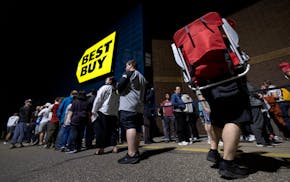Consumers continue to be more selective about big-ticket purchases, behavior that's rippling through Minnesota's leisure and recreational vehicle industry.
Eden Prairie-based Winnebago Industries on Wednesday announced a C-suite shakeup and promised inventory management moves as it reported a net loss for its fourth fiscal quarter. The day before, Medina-based Polaris said profits were down 80%.
The two companies — as well as Thor Industries, the large RV manufacturer based in Indiana — said they do not expect the retail environment to get much better over the next six months.
"Retail continues to be challenging — sluggish would even be probably the right word — in a comp year-over-year context," Winnebago CEO Michael Happe told analysts Wednesday.
That environment for vehicles from ATVs and RVs to pontoons is also trickling down to dealers, who say people are putting off purchases. They have had to cut prices to get customers in the door and buying.
In some instances, it means customers are holding onto vehicles longer.
"It's not that there aren't people interested in the market or interested in the recreation product," said Thomas Dehn, who owns seven Power Lodge locations in Minnesota and Florida. "I think they're going to keep using their product until it becomes affordable."
Polaris CEO Mike Speetzen said Wednesday the Federal Reserve's 50-basis-point cut in interest rates in September has not moved the market for recreational vehicles. He said customers are waiting for more cuts to make a decision.
While inflation has eased, prices in many cases haven't gotten any lower. Inflation peaked in mid-2022, falling since then from 9% to 2.4% in September. And even though wages have kept pace, people are trying to figure out how to manage a higher monthly budget.
At Up North Power & Sports in Park Rapids, Minn., sales are up on a unit basis, but profits are down, said general manager Nick Mills. The dealership is having to offer higher incentives, though, to clear out its high inventory levels amid low demand.
"You're having to work twice as hard to sell what you've had over the past few years," Mills said.
Justin Ogg, general manager at Chopper Powersports in Fridley, also said customers are looking at price. Margins are slimmer because the market "will dictate the value of what things are."
"Nobody needs anything that's coming through our door," Ogg said. "They're here because they want to be here, so we try to match their enthusiasm with our enthusiasm and passion."
Polaris, which has already taken steps to lower inventories, lost some market share over the summer to competitors willing to take steep price cuts. Now, it must continue to make operational adjustments as the market rights itself.
The boat sector also is suffering.
Canada-based BRP Inc.'s marine business has struggled since it re-entered the marine category in 2018 with acquisition of Alumacraft and other brands. At the time, Alumacraft had 250 employees, but BRP laid off 68 employees in September 2023 and more than 100 in May. Now BRP is pulling up anchor on its marine division.
Citing the challenging macroeconomic conditions, the company announced last week it was selling the division, including the Alumacraft brand, Manitou pontoon boats and the Quintrex line of aluminum boats.
"After careful consideration and given the current dynamics of both the marine and powersports industries, we have decided to double down on our core powersports activities and to sell our marine businesses," said BRP CEO José Boisjoli in a news release.
Martin Landry, an analyst with Stifel Nicolaus Canada Inc., noted that sales in BRP's marine businesses have been lackluster ever since re-entering the category and that BRP's management didn't see a turnaround in the short term.
"Revenues from that segment peaked in FY 2020 at $560 million, while in FY25, management guides for revenues to range between $220 million and $260 million," Landry wrote. "This significant decline from the peak is mostly due to the challenging industry conditions."
Winnebago and Polaris also have marine businesses they are trying to guide through the same consumer environment as their other divisions. Happe said Winnebago's Chris Craft and Barletta brands each gained market share, but overall sales in the company's marine sector were down 17%.
Sales in Winnebago's Towables RV segment were down 7% for the quarter and the year and its motorhomes segment was down 3% and 18% for quarter and the year, respectively. But performance of the Winnebago branded vehicles within those businesses prompted Happe to make management changes.
Chris West was promoted to president of the Winnebago-branded Motorhome and Specialty Vehicles business. And Don Clark, a co-founder and president of Grand Design, was promoted to group president of the Towables segment, giving him oversight on both the Grand Design and Winnebago branded towable RVs.
Speetzen said Polaris, too, gained market share with its Bennington and Godfrey boat brands, but because so many more people than usual bought boats during the pandemic, "it's going to be a little bit of time for that to work through the system."
Because of bloated inventories at dealerships, Polaris had to make additional shipment cuts during the third quarter, contributing to total sales being down 23%, Speetzen said.
"While these actions negatively impacted our short-term results, they were a necessary move to support our strong partnership with dealers and to hold firm to our commitment to reduce dealer inventory," he told analysts Tuesday. "As I discussed on our Q2 earnings call, we continue to make prudent moves to manage profitability in this part of the cycle."
Caleb Fravel is a University of Minnesota student reporter on assignment for the Star Tribune.

UnitedHealth sues the Guardian, alleging defamation in coverage of nursing home care

Prices for international flights drop as major airlines navigate choppy economic climate
Minnesota's med spa industry rises in popularity — and with little regulation

Hundreds line up at Best Buy to nab Nintendo Switch 2, in scene like '90s opening parties

